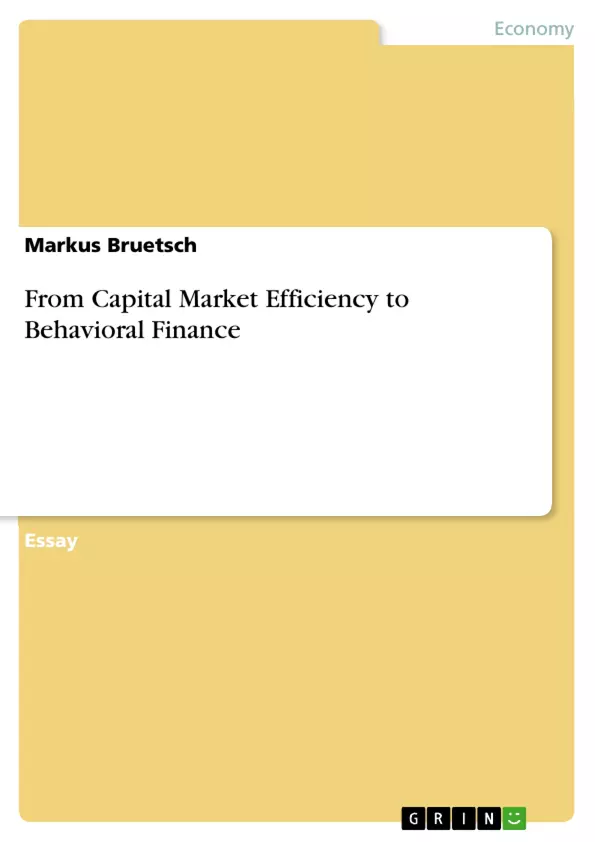Ever since in the history of stock markets, financial theorists try to understand how investors take decisions under uncertainty in order to value stocks precisely and predict their future returns. Their wish to develop a consistent model gave raise for various theoretical approaches and empirical examinations. This work tries to give a short overview on the traditional theory of asset pricing and discusses the need for a paradigm change due to the recent development in the US and UK stock markets.
Inhaltsverzeichnis (Table of Contents)
- Introduction
- The Theory of Market Efficiency
- Forms of information efficient markets
- Weak Form
- Semi-strong Form
- Strong Form
- Asset Pricing
- Capital Asset Pricing Model (CAPM)
- Arbitrage Pricing Theory (ABT)
- Recent Development in the US and UK Stock Markets
- The Bubble
- From Efficient Market Theory to Behavioural Finance
- unrealistic Assumptions in CAPM
- Evidence for additional Factors
- Seasonal Effects
- Size Effects
- Value Effect
- Momentum Effect
- Behavioural Approach
- Alternative Theories in Asset Pricing
- Model of Investor Sentiment
- Overconfidence Model
- Conclusion
Zielsetzung und Themenschwerpunkte (Objectives and Key Themes)
This work aims to provide a comprehensive overview of the traditional theory of asset pricing and examine the need for a paradigm shift in light of recent developments in the US and UK stock markets. The author explores the implications of these developments for the Efficient Market Theory and investigates alternative theories of share pricing that may better explain observed market behavior.
- The Efficient Market Theory and its limitations
- Recent trends in the US and UK stock markets
- Alternative theories of asset pricing
- The impact of investor behavior on market efficiency
- The need for a new paradigm in understanding market behavior
Zusammenfassung der Kapitel (Chapter Summaries)
The introduction provides a brief overview of the historical development of stock market theory and discusses the importance of understanding investor decision-making under uncertainty. Chapter 2 delves into the theory of market efficiency, examining its various forms and exploring the theoretical foundations of asset pricing models such as the Capital Asset Pricing Model (CAPM) and the Arbitrage Pricing Theory (ABT). Chapter 3 analyzes recent developments in the US and UK stock markets, particularly the emergence of market bubbles and the implications for the Efficient Market Theory. The chapter also explores evidence for additional factors influencing stock prices beyond traditional economic variables, such as seasonal effects, size effects, value effects, and momentum effects. It then introduces a behavioural approach to understanding market behavior. Chapter 4 explores alternative theories of asset pricing, such as the Model of Investor Sentiment and the Overconfidence Model, which attempt to incorporate investor psychology and cognitive biases into market analysis. The conclusion summarizes the key findings and discusses the implications for future research and investment strategies.
Schlüsselwörter (Keywords)
Efficient Market Theory, asset pricing, stock market behavior, US and UK stock markets, market bubbles, behavioural finance, investor sentiment, overconfidence, alternative theories, paradigm shift.
Frequently Asked Questions
What is the Efficient Market Theory?
The theory suggests that stock prices reflect all available information, making it impossible to consistently achieve higher returns without taking on additional risk.
What are the limitations of the Capital Asset Pricing Model (CAPM)?
The CAPM relies on unrealistic assumptions, such as rational investors and perfect markets, which fail to explain anomalies like seasonal or momentum effects.
What is Behavioral Finance?
Behavioral Finance is a field of study that incorporates psychological factors and cognitive biases to explain why investors often make irrational financial decisions.
What are "market bubbles" in the context of this work?
The work analyzes developments in US and UK markets where prices deviated significantly from fundamental values, challenging the notion of market efficiency.
What is the Overconfidence Model?
It is an alternative asset pricing theory suggesting that investors tend to overestimate their own knowledge and ability, leading to excessive trading and market volatility.
- Quote paper
- Markus Bruetsch (Author), 2002, From Capital Market Efficiency to Behavioral Finance, Munich, GRIN Verlag, https://www.hausarbeiten.de/document/14846


